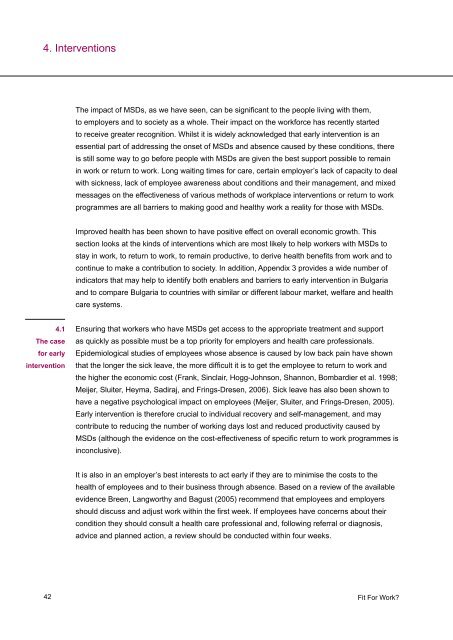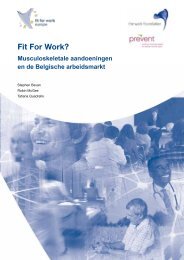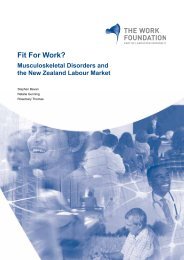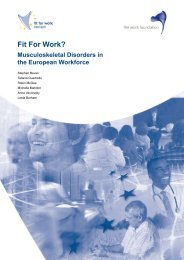FfW Bulgarian report (English language) - Fit for Work Europe
FfW Bulgarian report (English language) - Fit for Work Europe
FfW Bulgarian report (English language) - Fit for Work Europe
Create successful ePaper yourself
Turn your PDF publications into a flip-book with our unique Google optimized e-Paper software.
4. Interventions<br />
4.1<br />
The case<br />
<strong>for</strong> early<br />
intervention<br />
42<br />
The impact of MSDs, as we have seen, can be significant to the people living with them,<br />
to employers and to society as a whole. Their impact on the work<strong>for</strong>ce has recently started<br />
to receive greater recognition. Whilst it is widely acknowledged that early intervention is an<br />
essential part of addressing the onset of MSDs and absence caused by these conditions, there<br />
is still some way to go be<strong>for</strong>e people with MSDs are given the best support possible to remain<br />
in work or return to work. Long waiting times <strong>for</strong> care, certain employer’s lack of capacity to deal<br />
with sickness, lack of employee awareness about conditions and their management, and mixed<br />
messages on the effectiveness of various methods of workplace interventions or return to work<br />
programmes are all barriers to making good and healthy work a reality <strong>for</strong> those with MSDs.<br />
Improved health has been shown to have positive effect on overall economic growth. This<br />
section looks at the kinds of interventions which are most likely to help workers with MSDs to<br />
stay in work, to return to work, to remain productive, to derive health benefits from work and to<br />
continue to make a contribution to society. In addition, Appendix 3 provides a wide number of<br />
indicators that may help to identify both enablers and barriers to early intervention in Bulgaria<br />
and to compare Bulgaria to countries with similar or different labour market, welfare and health<br />
care systems.<br />
Ensuring that workers who have MSDs get access to the appropriate treatment and support<br />
as quickly as possible must be a top priority <strong>for</strong> employers and health care professionals.<br />
Epidemiological studies of employees whose absence is caused by low back pain have shown<br />
that the longer the sick leave, the more difficult it is to get the employee to return to work and<br />
the higher the economic cost (Frank, Sinclair, Hogg-Johnson, Shannon, Bombardier et al. 1998;<br />
Meijer, Sluiter, Heyma, Sadiraj, and Frings-Dresen, 2006). Sick leave has also been shown to<br />
have a negative psychological impact on employees (Meijer, Sluiter, and Frings-Dresen, 2005).<br />
Early intervention is there<strong>for</strong>e crucial to individual recovery and self-management, and may<br />
contribute to reducing the number of working days lost and reduced productivity caused by<br />
MSDs (although the evidence on the cost-effectiveness of specific return to work programmes is<br />
inconclusive).<br />
It is also in an employer’s best interests to act early if they are to minimise the costs to the<br />
health of employees and to their business through absence. Based on a review of the available<br />
evidence Breen, Langworthy and Bagust (2005) recommend that employees and employers<br />
should discuss and adjust work within the first week. If employees have concerns about their<br />
condition they should consult a health care professional and, following referral or diagnosis,<br />
advice and planned action, a review should be conducted within four weeks.<br />
<strong>Fit</strong> For <strong>Work</strong>?







